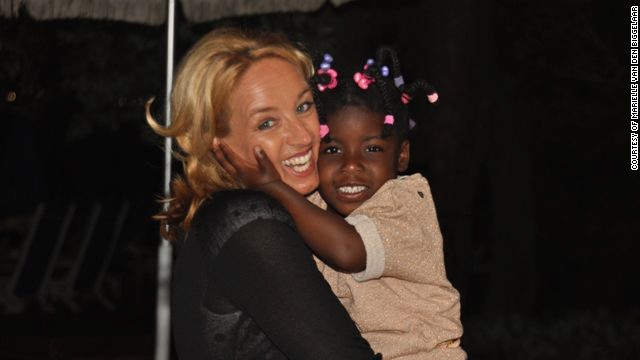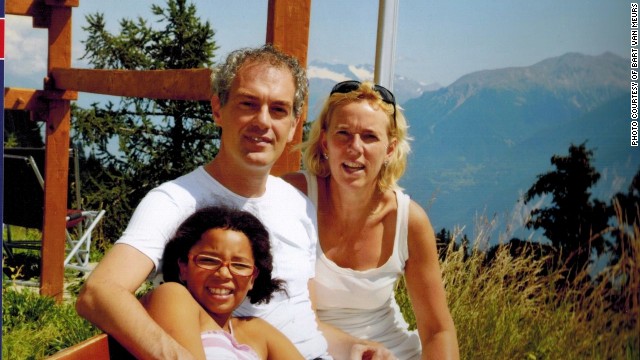

Elisa van Meurs grew up with a Polish au pair, speaks fluent Dutch and English and loves horseback riding -- her favorite horse is called Kiki but she also rides Pippi Longstocking, James Bond, and Robin Hood. She plays tennis and ice hockey, and in the summer likes visiting her grandmother in the Swiss Alps. "It's really nice to go there because you can walk in the mountains and you can mountain bike ... you can see Edelweiss sometimes," said the 13-year-old, referring to the famous mountain flower that blooms above the tree line.
It's a privileged life unlike that of her birth mother, a woman of African American descent from Indianapolis who had her first child at age 15. Her American family is "really nice but they don't have a lot of money to do stuff," said Elisa, who met her birth mother, and two siblings in 2011. "They were not so rich."
While the number of international adoptions is plummeting -- largely over questions surrounding the origin of children put up for adoption in developing countries -- there is one nation from which parents abroad can adopt a healthy infant in a relatively short time whose family history and medical background is unclouded by doubt: The United States.
"I thought it was so strange. I'm here in Holland and they're telling me I can get a baby" from the U.S., recalled Elisa's father, Bart van Meurs, who originally planned to adopt from China or Colombia but held little hope of receiving an infant. "This can't be true." But less than 18 months later, van Meurs and his wife Heleene were at an Indiana hospital holding four-day-old Elisa.
While the typical tale of international adoption is U.S. families adopting a child from abroad, foreign families like the van Meurs adopt scores of U.S. children each year. The numbers are far lower than the thousands of overseas children adopted each year by U.S. families, but over the past decade the number of U.S. children adopted by foreign parents has been steadily rising -- and almost all of the children are of African American descent like Elisa, say attorneys who facilitate international adoptions.
U.S. laws that allow birth mothers to choose the adoptive family of their children feed that growth, as some prefer to see their kids grow up in an exotic overseas locale rather than the U.S., experts say.
"A family from Indiana might talk about taking their child on vacation to Florida, to Disneyworld. A Dutch family talks about taking their child on vacation to the south of France or the Alps," said Steven Kirsh of Kirsh & Kirsh, an Indianapolis law firm that has helped place hundreds of children with families in Europe.
Escape from racism
When Susan, a Florida resident, chose to give up her son for adoption in 2006, the social worker gave her three binders with information about three prospective families. But she only needed to see the first binder of a couple from the Netherlands to make her decision. "If my mother had lived, she'd look just like (the prospective Dutch mother)," recalled the 37 year old, who asked that her last name not be used. Her own mother died when she was two months old.
Susan also wanted her son to grow up far away from the life she knew. She was a 30-year-old prostitute addicted to crack beginning a prison sentence when she learned she was pregnant. She did not know whether the child's father was a man who raped her "for hours" or a drug dealer whom she "had done something with" one time, she said. But both men were African American, and she believed the child would face discrimination growing up in the United States.
"There's too much prejudice over here. The white people are going to hate him because he's half black, and the majority of black people are going to hate on him because he's half white," said Susan, who is Caucasian. "And then he'll have to do extra things to prove what kind of a Negro he is, and extra things to prove what kind of a honky he is and I don't want that. I did not want that for my kid."
Even her own daughter, then aged 11, said "she would never accept that n***** child."
Susan is not alone, says Adam Pertman, Executive Director of the Donaldson Adoption Institute and author of "Adoption Nation." Many birth mothers have a perception that their black or mixed-race children will not face the same race issues in the Netherlands as in the United States.
"In the United States, as much as Americans want to believe it's not true, we are still a country where there is a least some degree of racial prejudice. The birth mothers' perception of Holland, in particular, was that the same was not true in Holland. There's that feeling that maybe we can escape those issues if (the child is) somewhere else."
Among the families were Marielle van den Biggelaar, a stay-at-home mom and her husband, Marnix, a sales manager for a women's clothing brand, who adopted their two children, Eva, four, and two-year-old Norbert as babies from Florida and New York, respectively. "For the kids it's really important to see that they're not alone and that all these kids have the same history, and they're all adopted and they're all from the same country," Marielle said.
"It's really nice to see them all together and to talk to each other about experiences -- with their hair and with their skin -- and they're all the same people with the same mindset, so it's really fun for the kids and for us, as well."
The couple encourages their children to embrace their American origins, celebrating Thanksgiving each year with other families who adopted children from the United States. "We try to tell them about their culture and about their background," said Marielle, who decided to adopt after years of unsuccessful fertility treatment. "We would love them to (start speaking) English when they're really young because if they want to go back (to America) and if they want to see where they're born, it would be nice if they can speak to ... their parents if they are going to meet them."
Their children stand out in Het Gooi, a village about 30 miles (50 kilometers) from Amsterdam. "They're famous here, where we live, because it's a really white society," Marielle said.
http://edition.cnn.com/2013/09/16/world/international-adoption-us-children-adopted-abroad/index.html?hpt=hp_c3
No comments:
Post a Comment